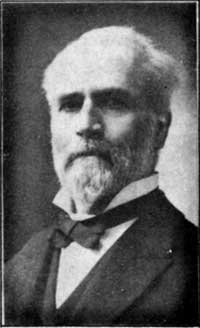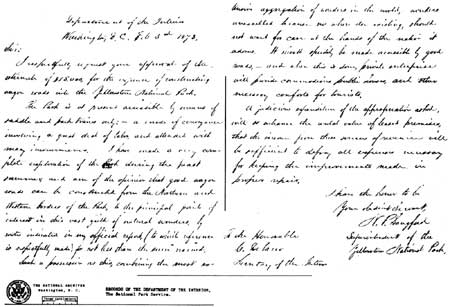|
"National Park" Langford

LANGFORD
|
The letter [page 12] chosen by Mr. Kahn to illustrate
the interesting documents relating to the Service which are to be found
in The National Archives, evokes memories of the first Superintendent
of Yellowstone National Park, who also was explorer, vigilante and
historian. He was Nathaniel P. ("National Park") Langford whose death
in 1911 closed a full and adventuresome career. He went from New York
state to Minnesota in 1854 and from there in 1862 he joined Captain
James L. Fisk's Northern Overland Expedition to the Salmon River gold
fields. With a few hardy souls he reached Bannack, Montana, 400 miles
from the nearest permanent settlement. Gold had been discovered there
the year before and outlaws and gunmen were attracted to the "diggings"
from all parts of the West. Among them was Henry Plummer, speed draw
artist and killer who, by 1863, had had himself
elected sheriff. While masquerading as the arm of the
law he directed a gang of cutthroats and robbers which terrorized the
entire southern half of Montana. Within a few months 102 men had been
killed or robbed. The situation became desperate. In a country where
there was no law or order, self-respecting citizens organized in
defense of their lives and property and formed the famous vigilante
committee of Bannack and Virginia City. Langford was one of its
leaders. In the end, 24 members of Plummer's gang were hanged and eight
were banished. Plummer himself was hanged in 1864 on a gallows that he
had erected as sheriff. Langford's Vigilante Days and Ways
(2 vols., 1890) has become a valuable item of Americana and an authority
on early Montana history.

The letter reproduced above is an example of the valuable
documents relating to the development of the National Park System which
are available in The National Archives. Written 67 years ago this
month by "National Park" Langford, first Superintendent of the
Yellowstone, it is believed to constitute the first request ever
made for "roads and trails" funds for a national park. More about
Langford appears on pages 17-18.
(click on image for an enlargement in a new window)
When Montana Territory was organized in 1864,
Langford was appointed U. S. Collector of Internal Revenue. In 1868 he
was twice removed by President Johnson and twice reinstated by the
Senate. In December, 1868, President Johnson appointed him Governor of
the Territory, but his appointment was not confirmed by the Senate.
In 1869, D. E. Folsom was driven back from the
Yellowstone country by hostile Indians. In his desire to explore the
region more fully and to take steps to preserve adequately that
wonderful region he approached General H. D. Washburn, Surveyor-General
of Montana, Judge Cornelius Hedges, and Langford. General Sheridan
promised a military escort and an expedition to the Yellowstone Country
was organized. The group, known commonly as the Washburn-Langford-Doane
Expedition, left Helena, Montana, August 17, 1870. Diaries were kept by
Washburn, Langford, Hedges and Doane, and all subsequently were
published. Langford's Diary of the Washburn Expedition to
Yellowstone and Fire Hole Rivers in the Year 1870, a fine piece of
descriptive writing, is easily the best.
Hedges and Folsom, each independently of the other,
suggested that the Yellowstone region be made a national park. It was
Langford, however, by lectures and writing and especially his articles
in Scribner's Magazine, and his persistent work in Washington,
who was most influential in assuring the establishing of Yellowstone.
With William H. Clagett, the delegate to Congress from Montana, he wrote
the Yellowstone Park bill. The boundaries were drawn by Dr. Heyden.
These three men, more than all the others, were responsible for the
passing of the bill that established the first National Park and
initiated a lasting and ever-enriching conservation movement.
The Secretary of the Interior appointed Langford the
first Superintendent of Yellowstone National Park. For five years he
served in this capacity without compensation and without funds to carry
out the duties entrusted to him. His will remain one of the first names
in the national park movement in the United States. He was a worthy
representative of the strong men who shaped the destinies of the West
when the test of courage was action as well as words. --- Roy Edgar
Appleman.
|

